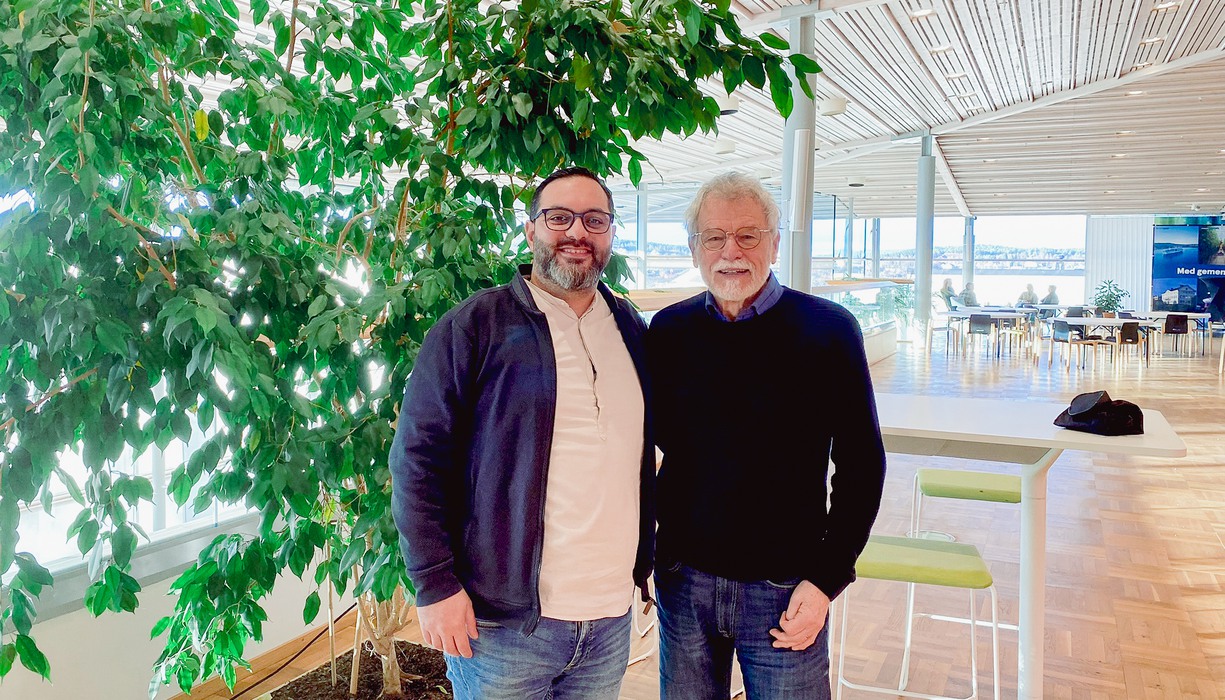Nawras and Olof have a blue-green faith in the future
It started with a meeting in a refugee camp in October 2015. Today, Olof Frensborg and Nawras Alashour run the foodtech start-up BlåGrön Odling together. 2025 will be the year when the company establishes itself on the market in earnest.

Nawras Alashour and Olof Frensborg runs the foodtech start-up Blågrön odling.
The business idea is to offer small complete growing systems for shops or restaurants. Small, circular systems where spices and vegetables can grow close to the end consumer instead of being transported hundreds of miles are a win for both quality and the environment.
The technology is called hydroponics and the first model from BlåGrön Odling was installed in 2021. With a few more years of development, Nawras and Olof have learned more about both which crops work best and how the cultivation systems need to be designed to be easy to manage and profitable for the stores.
- "We talk about low cost, medium tech, high yield - we want it to be a crop that gives a high yield at a low price by using a relatively simple technique," says Nawras Alashour, Development Manager at BlåGrön Odling.
"Small, circular systems where spices and vegetables are grown close to the end consumer instead of being transported hundreds of miles are a win for both quality and the environment"
In simple terms, Blågrön Odling's offer means that the company installs a "mini greenhouse" in the store. The store receives trays of pre-sown plugs and the greenhouse itself ensures that the plants receive the right amount of nutrient-enriched water and grow. Staff finish growing the crops, harvest and sell them, and then send the tray back.
Two facilities have already been established in Central Norrland and more are planned for 2025. BlåGrön Odling has raised just over SEK 2 million in new capital and if everything goes according to plan, the company will soon be able to hire its first employees.
It is a long journey that BlåGrön Odling has made from idea to a finished product and business model. And it all started at a refugee center in Härnösand in October 2015. Nawras, a seller from Syria, came there with his family, and met Olof, a retired consultant in Swedish at Brunnskyrkan.
Nawras was quick to welcome Olof and his wife to the cell in the reception center that was his small family's first accommodation in Härnösand. It was there that their friendship clicked, and Nawras was eager to find out how he could make a living in Härnösand. The friendship grew. Eventually, they formed the economic association that was the embryo of the company BlåGrön Odling and, with the support of Leader Höga Kusten, they were able to launch a project.
"Härnösand has become a bit of a hub for foodtech, aquaponics and hydroponics. There is a knowledge base and interest in this area that makes it easy to exchange ideas and experiences"
Olof Frensborg
The pandemic shifted the project from indoor cultivation to hydroponic cultivation in greenhouses. At the end of the project, an ICA retailer contacted us and ordered a cultivation facility for his store. This was the start of BlåGrön Odling AB. In the transition to starting a company with new tasks to solve, the experience from the project time came in handy. In addition, the ICA retailer joined as a partner in the new company. BlåGrön Odling has managed to survive thanks to stubbornness and a strong focus on development and finding solutions.
- We were down to earth! We really had to cut corners to survive and it taught us to prioritize hard and seek simple, functional solutions. It's part of our identity now," says Olof Frensborg.
What has it been like to start a business in Härnösand?
- "Härnösand has become a bit of a hub for foodtech, aquaponics and hydroponics, so in that way it's no coincidence that we've ended up where we are today. There is a knowledge base and an interest in this area that makes it easy to exchange ideas and experiences," says Olof Frensborg.
He points to companies such as Agtira (formerly Peckas Tomater) and Big Akwa, vocational training in both aquaponics and urban farming, and a positive attitude from the municipality.
- "We have received good support to get started and the contact with Bizmaker has meant a lot to us," says Nawras.
